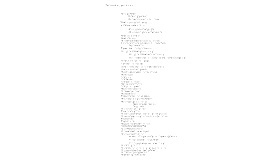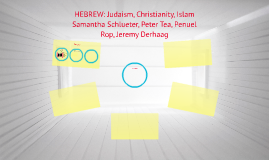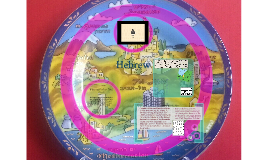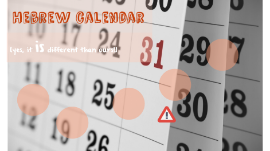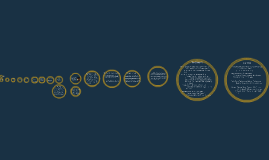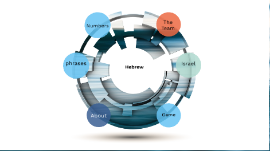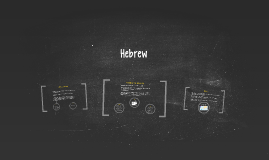Hebrew
Transcript: Hooker, Richard. "Palestine." Palestine. , n.d. Web. 06 Oct. 2014 Leisure Activities "Verses 11-12 This story is about a son who went away from home. He lived a bad life in a foreign country. In the end, he came home to his father. The purpose of the story is to show the love of the father. He waited for his son to return. When the son came home, the father gave to him a warm welcome. They had a great party. This is to show how God the Father loves even the worst *sinner. There is joy in heaven over each *sinner who comes back to God. Then there is the contrast between the father and the older brother. Perhaps this is to show the attitude of many of the *Pharisees and teachers of the law. The brother would not come in to the party. He would not forgive his brother." Sources The Parable of the Prodigal Son (Churchyard) "In 1020 B.C the Hebrews united under one king named Saul to from a nation called Israel. Saul was succeeded by his son-in-law David, was established Jerusalem. David was Succeeded by Solomon, who build the great Temple of Solomon. After Solomon's death, internal fights divided the two kingdoms. Israel in the north and Judah in the south. " ("The Ancient Hebrews: History, Arts, and Culture" 22) The Kingdom of Israel Rich, Tracy. "Judaism 101: Shabbat." Judaism 101: Shabbat. Tracy Rich, n.d. Web. 17 Oct. 2014 The Parable of the Prodigal Son was a story told by Jesus Christ and recorded by Luke Verse 10-13 use imagery to describe how water comes from the ground then goes to streams and rivers. In verse 13 the speaker returns to the image of the world God created, with the water still falling on the mountains. Verses 14-18 explain how God makes plants grow and men and animals use these plants for nourishment. The mountains, hills, and rocks that are nearby are the shelter for the animals. Verses 19-23 are about time. God made the night and night was when the animals came out of their dens. When God brings the light of day humans come out to do their work. By: Brooke, Nia, and Jack In ancient Hebrew, most of the society was dominated by males. Women had a few rights outside the home. Nevertheless, some women did rise to great heights. Sources Psalm 104 (Rembrant,1667) Psalm 23 2000-1200 B.C. Their Education 1020-922 B.C. "Over the next 200 years, Israel and Judah sometimes fought each other and sometimes allied against outside enemies. The most powerful of their enemies were the Assyrians, to whom Israel fell to in 722 B.C. 150 years later, Judah fell to Babylonian King Nebuchadnezzar II, who destroyed Jerusalem and the temple in 586 B.C. Most of the surviving Jews were exiled to Babylon, until King of Cyrus the Great, conquered Babylonia and lets the Jews return home." Alpher, Joseph. Encyclopedia of Jewish History: Events and Eras of the Jewish People. New York, NY: Facts on File Publications, 1986. Print. Back in ancient times, the only people who had leisure time were the rich and ruling classes, never for the severing or laboring classes. So, since they worked all the time they didnt have time for any sports or fun activites. ("Rich, Tracy") The ancient Hebrew education is as essentially familial. The mother would teach young kids and girls, while the father took the responsibility of providing a meal, religious, and handcraft instruction for a growing son. ("Marrou, Henri-Irénée") The Parable of the Prodigal Son The story says that when an item is lost, that we should stop at nothing to find it, and when we do find it we should celebrate. "Most of the Hebrews' history tells of nomadic life, migration, or slavery. The Hebrews' found a home in Canaan. Once they got here they established the kingdom Israel, built Solomon's Temple and wrote down text called the Torah. ("Mesopotamian, Egyptian, and Hebrew Literature" 17) The Exodus "Verses 13-20 When the younger son had his money, he left home. He went a long way to a foreign country. He had plenty of funds at first but he was not sensible with them. He was careless and he wasted all his money. It was his own fault that he became poor. He could not afford to buy food and he was hungry. This was partly because there was a severe lack of food in that country. He went back to his father. The father had hoped that this son would return. All the time he had looked for his younger son. The father saw him while he was still a long way off. The father was so happy that he ran to him. He hugged his son and he kissed him." (Gordon Churchyard, www.easyenglish.com) The Parable of the Prodigal Son Hebrew Psalm 104 was written by David. Psalm 104 is about the creation of earth, all that live in it, and his presence in earth as well. The speaker uses imagery and metaphors to describe the process. Churchyard, Gordon."Psalm 104:1-35." Psalm 104. Wcycliffe Associates (UK), July 2002. Web. 15 Oct. 2014. Societal Norms Psalm 104 (Shmoop Editorial Team) 922-539 B.C. The poem was known as a pastoral poem which is a poem about a shepherd and their simple life. The






